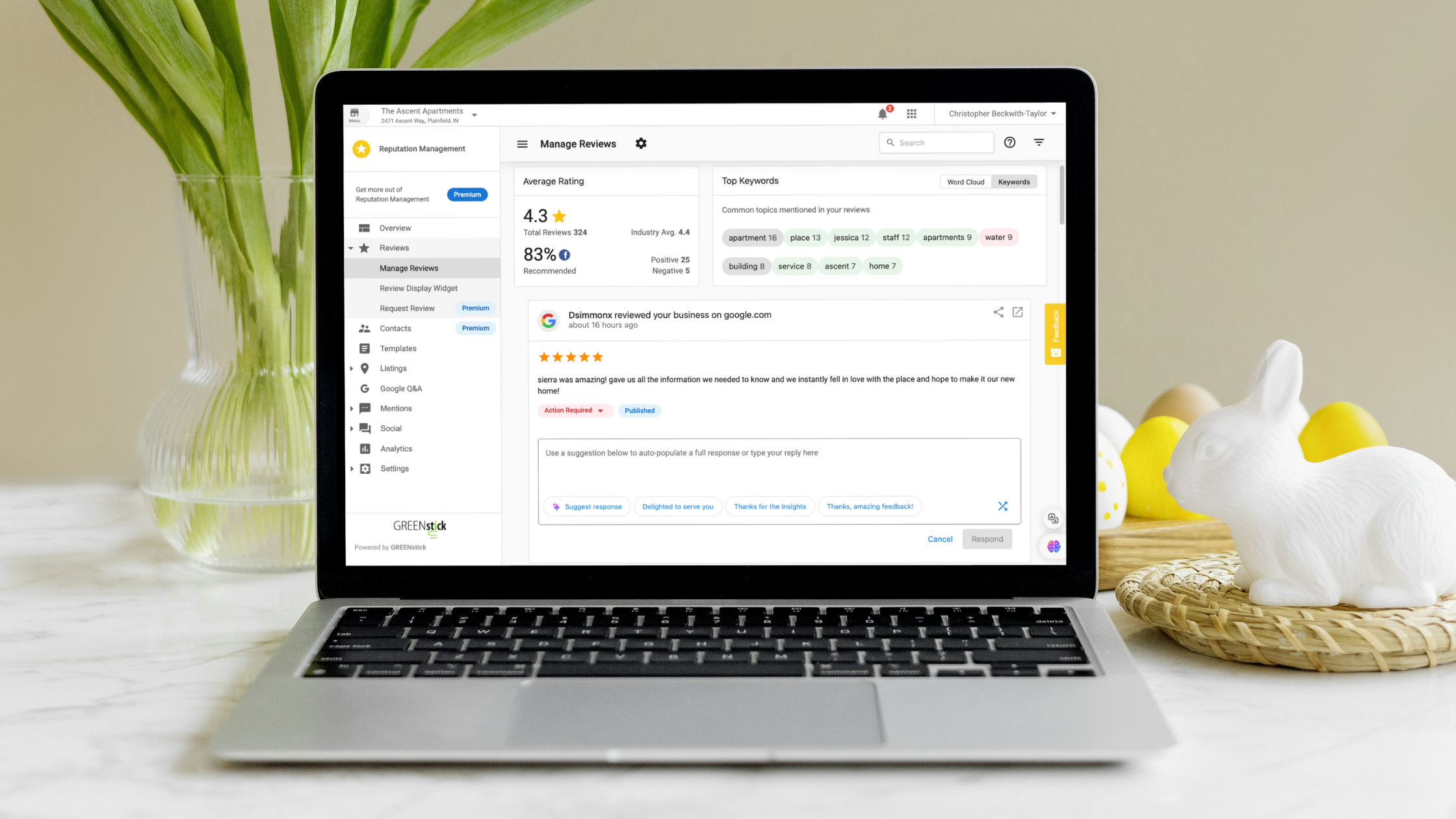Welcome to the ultimate reputation management guide. In this article, we will explore the world of reputation management and understand its importance for local businesses. Managing your reputation is a key aspect of running a successful business, and that means it extends beyond the face-to-face interactions you have with your customers every day.
We’ve compiled this guide to help you better navigate online and offline reputation management, so look forward to our tried and true strategies, tools, and expert tips to build and maintain a positive reputation for your local business.
What Is Reputation Management?
Reputation management involves actively influencing and controlling how others perceive your business—this includes customers, competitors, and the general public. It involves managing your reputation both online and offline, as your business’s image can and will be shaped by how you navigate digital and real-world experiences.
Why Is Reputation Management Important for Small Businesses?
Whether you like it or not, the way people perceive you online plays a crucial role in shaping your overall reputation. Everyone has a smartphone now, and customers will more often than not turn to the internet to learn about what’s available in their area before making a decision.
Therefore, having a positive online image that makes you shine brighter than the rest is what you need to earn their cold, hard cash. Here’s how you can manage it:
Online Reputation Management
Tools for Monitoring Your Online Presence
- Google Alerts and Social Media Monitoring: These tools help you keep track of mentions and discussions related to your business on the internet.
- Online Review Platforms: Monitoring reviews on platforms like Google, Yelp, and Facebook allows you to stay informed about what customers are saying.
- Social Listening: This involves tracking conversations on social media to understand how your business is perceived.
Respond to Online Feedback
Managing online feedback, both positive and negative, is the secret to exceptional reputation management. By engaging with your customers online, you can demonstrate your commitment to their satisfaction and continued business.
Build a Positive Online Presence
To enhance your online reputation, consider these strategies:
- Social Media Engagement: You know what sets you apart, but do your potential customers? Active and engaging social media profiles can help you shape your unique value proposition and create a positive brand image.
- Content Marketing: Creating useful and engaging content helps showcase your expertise and reliability.
- Partnerships: Collaborating with local influencers, charities, or causes can boost your credibility and reach a wider audience.
Offline Reputation Management
While your online reputation is important, your offline reputation carries equal weight. Here’s what you need to do to improve it:
Provide Exceptional Customer Service
As the saying goes, word travels. So, make sure the latest gossip going around about you is nothing but good news. Offering exceptional customer service leaves a positive impression on your patrons and can potentially lead to positive word-of-mouth referrals.
Community Involvement and PR
Engaging with your local community and participating in public activities shows the people living there that you are invested in giving back to your community. If you do something good for others, make sure to show it off. Write a blog post about it on your website, share photos on social media, and try to get noticed in the local newspaper.
Handling Crises and Negative Press
While we always hope it will never happen, it is better to expect the best and plan for the worst. That means in times of crises or negative press, a well-prepared strategy can help you address issues and protect your reputation.
How to Build a Reputation Management Strategy
Creating a reputation management strategy involves several steps:
- Research, Observe, and Evaluate Your Online Image: Understand how your business is currently being perceived online through reviews, comments, and mentions. Is there something you could be doing better?
- Formulate Multiple Strategies: Develop plans to manage your reputation, both reactively and proactively.
- Establish a Communication Style Guide: Create guidelines for addressing comments and feedback professionally and consistently.
- Share Your Plan: Communicate your reputation management strategy with your team or organization to ensure everyone is on the same page.
- Implement Changes: Good or bad, all feedback is valuable, so make improvements based on these comments to enhance your reputation.
- Keep Records: Document your progress and outcomes as you work to build and maintain a positive reputation. That way, you can learn from your mistakes and devise better strategies.
Tools and Strategies for Reputation Management
Reputation management relies on a combination of tools and strategies. In this section, we are going to dive deeper into the key elements of reputation management to help you make the most of these tools:
Online Reputation Management Tools
Do you need to keep close tabs on what people are saying about you but are short on time? That’s when a reputation management tool could come in handy. Let’s take a look at a few of the most popular ones out there:
1. Social Monitoring Tools
These tools allows you to keep track of your brand’s mentions and conversations on various social media platforms. You can quickly identify what people are saying about your business and respond accordingly.
2. Google Alerts
Set up alerts for your business name, products, or relevant keywords. Google will notify you when new content related to your business appears online, allowing you to stay informed.
3. Review Tracking Software
There are various tools designed specifically for tracking and managing online reviews. They help you monitor review platforms like Yelp, Google, and Facebook, making it easier to respond promptly to customer feedback.
Reputation Repair Strategies
If your reputation has taken a hit, all is not lost. Reputation repair strategies can help you bounce back and regain the trust of your customers. Here’s how:
1. Professional Responses to Negative Reviews
When negative reviews surface, your response can make a big difference—craft professional, empathetic, and solution-oriented responses to address customer concerns. Offer to make amends and resolve issues to rebuild trust.
2. Request Reviews
Encourage satisfied customers to leave positive reviews to counterbalance the negative ones. A steady flow of positive feedback can overshadow past issues and even boost your reputation.
3. Incorporate Feedback
While we would all like to simply sweep bad comments under the rug, it’s best to actively address the issues raised in negative reviews. Negative reviews are often the most honest feedback you could receive, so use it as an opportunity to make improvements in your products or services. It helps you to demonstrate your commitment to customer satisfaction and showcase the positive changes you’ve made.
Proactive Reputation-Building Strategies
Being proactive is key to long-term success. Consider these strategies to strengthen your reputation:
1. Customer Service Excellence
Outstanding customer service is a cornerstone of a positive reputation. Make sure all your staff are trained to meet your customers’s needs best, address customer concerns promptly, and go the extra mile to exceed expectations.
2. Showcase Your Expertise
Position your business as a local expert by sharing valuable content, insights, and knowledge. This not only educates your audience but also builds trust and credibility.
3. Engage with the Community
We can’t emphasize this enough. Active community involvement and engagement can make all the difference for the folks you serve. Supporting local causes, participating in events, and contributing to your community is a great way to stand out from the rest.
Reputation management is an essential aspect of running a successful local business. Implement the strategies and tools outlined in this guide, and get ready to get noticed for all the right reasons.
In conclusion, effective reputation management requires a combination of tools, strategies, and proactive approaches. By utilizing online reputation management tools such as social monitoring tools, Google Alerts, and review tracking software, you can stay on top of what people are saying about your business and respond accordingly. In times of reputation crisis, employing reputation repair strategies like professionally addressing negative reviews and encouraging positive feedback can help rebuild trust with your customers. Furthermore, proactive reputation-building strategies such as focusing on customer service excellence, showcasing expertise, and engaging with the community can solidify your business’s positive image in the long run. To ensure your online reputation is in good hands, contact GREENstick Marketing today for expert assistance in managing and enhancing your brand’s reputation. Take charge of your online presence and stand out for all the right reasons!

